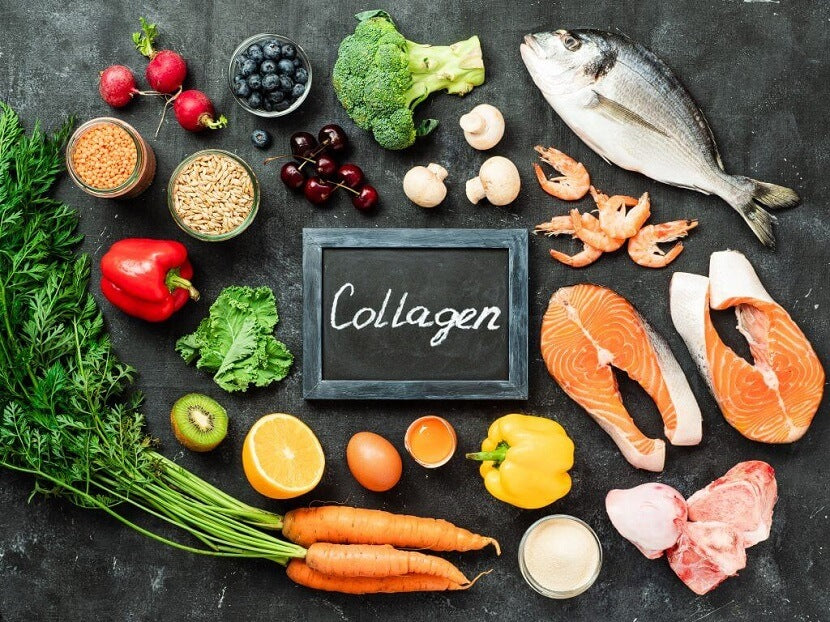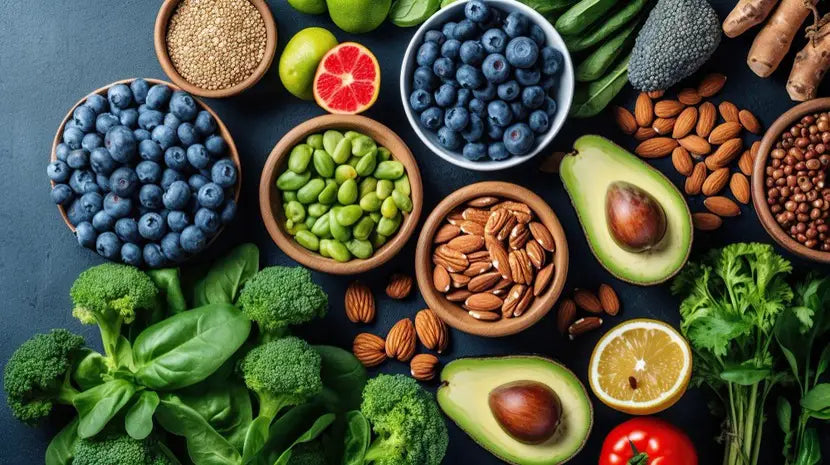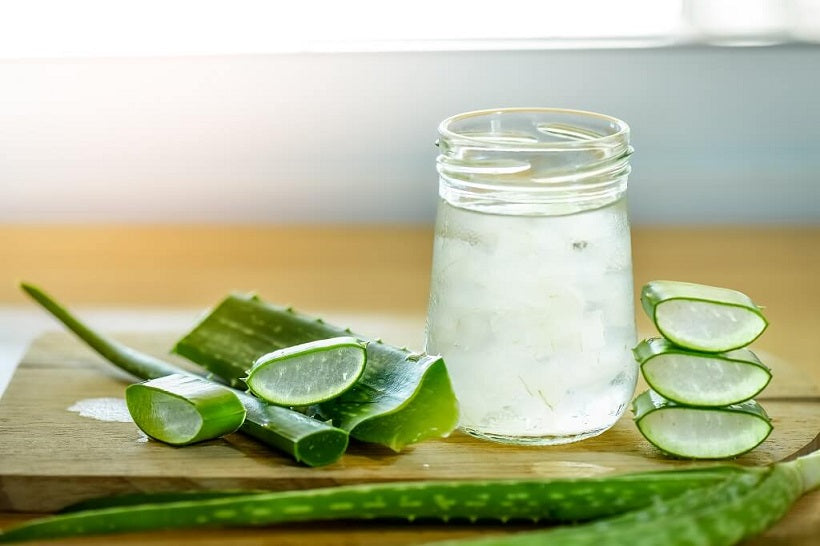It’s all about collagen. We need to make it, sustain it, keep it healthy, support it and make sure it’s abundant so our skin matrix can gobble it all up.
For anyone who wants glowing, lush skin…
*sings in high-pitch opera voice* – COLLAGEN!
Healthy collagen is absolutely essential for supple, radiant skin. Collagen is a fibrillar protein that conjoins connective tissues. It’s the scaffolding system of the skin, bone and joints. Think of it as a support net for all of your cellular structures, particularly your skin cells. When collagen is damaged and sufficient sources aren’t there to replace it, wrinkles start to increase and scar tissue can take longer to replenish.
Sun damage, smoking, alcohol, a low antioxidant diet, poor gut health and chronic inflammation can all influence how fast our skin matrix degrades. Our skin is quite a complex organ. It has a dermal-epidermal junction that exchanges oxygen, nutrients, and waste. Furthermore, it allows for anchoring of the epidermis to the connective tissue. As inflammation or aging progresses, the structural integrity and stability of this adhesion become compromised, leaving us vulnerable to wrinkle development.
What Are The Benefits Of Collagen?
Collagen peptides have been shown to increase cheek and canthus (outer or inner corner of the eye) hydration, elasticity, and skin surface texture. Increasing dietary collagen is a must for preventing premature ageing and slowing the ageing process. Research shows collagen peptides can significantly reduce wrinkle area, depth, and roughness, and we certainly hit a particular age where these little wrinkles start to pop up! Now I’m all about embracing natural ageing, but why not add in a little collagen to slow it down!
Just eight weeks of supplementing with collagen has shown to considerably improve skin elasticity, health and appearance. Collagen peptides are absorbed in the small intestines as amino acids, then transferred to the blood and into your skin dermis. Hydrolysed collagen peptides then form collagen-elastin fibres as well as self-stimulating new collagen, elastin and hyaluronic acid.
Collagen endogenously increases our other skin friend hyaluronic acid by stimulating it’s metabolism, migration and proliferation. Hyaluronic acid is a molecule that binds and retains water supporting the extracellular matrix. It’s another compound found in bones, joints, connective and epithelial tissue. Often, this is added to topical cosmetics for the lush hydration, but why not make it ourselves internally, too!?
How Does Collagen Help Skin?
Prevention is key to anti-aging, and cosmetically, if there’s one thing you would do for younger, fuller skin – it’s collagen. If you have inflamed, acne-prone skin, collagen can help reduce dermal inflammation and speed up wound healing. After skin has been damaged, it requires a cascade of internal events:
- Phase 1: Inflammation
- Phase 2: Immune cell infiltration to mitigate the tissue inflammation
- Phase 3: Remove pathogenic bacteria or organisms
- Phase 4: Remove tissue debris
- Phase 5: Promote and trigger new cell regeneration and structural support
- Phase 6: Nourish scar tissue with type 1 & 3 collagen fibres

Tissue repair overlaps with new tissue regeneration and requires healthy extracellular matrix integrity – this is where collagen is superior for healing. It has been shown that collagen peptides exert healing properties to seal the wound and reduce inflammation. Acne, rosacea and even dermatitis can impact quality of life, inducing states of low-confidence and self-esteem. For this reason, speeding up the wound-healing process is ideal in such conditions.
If you can nourish your skin from the inside out and add in skin-loving nutrients, you’re on the right track. Often with inflamed skin, you’re left with lesions that can take weeks or even months to heal. Collagen can help speed this process up as it has been shown to reduce inflammatory and non-inflammatory lesions.
That being said, collagen isn’t just all about cosmetic intervention – it’s also a fantastic antioxidant that has been shown to relieve joint or tendon pain and improve cardiovascular health, gastrointestinal health, cholesterol levels, and stamina.
How To Get Natural Collagen
Natural sources of collagen are animal-derived. These MUST be well-sourced (i.e. organic, grass-fed, free-range, or wild-caught). The highest levels of collagen come from:
- Beef, fish and chicken bones
- Duck feet
- Kangaroo tail
- Fish skin
- Bovine collagen
- Octopus
- Squid
- Cuttlefish
- Prawn

How To Build Collagen Nutrition Intake
1. Increase Organic Intake
Bone broths are super high in collagen as well as collagen-supportive vitamins and minerals. Slow cook the bones listed above (add in things like ginger, turmeric, celery, fresh herbs and apple cider vinegar)
2. Increase Probiotic Intake
Coconut kefir, coconut yoghurt, kimchi, sauerkraut, tempeh, miso, apple cider vinegar with the mother or home-made fermented teas.
3. Vitamin C
Dragon fruit, blackberries, blueberries, strawberries, gooseberries (acerola cherry), star fruit, and dark green leafy vegetables.
4. Beta-carotene
Foods with yellow/orange pigments like carrots, capsicum, turnip, pumpkin, sweet potato, oranges, mangoes, apricots, nectarines, peaches, persimmons, gooseberries, papaya, dark green leafy vegetables, and turmeric.
5. Vitamin E
These are best sourced from nuts, seeds, and cold-pressed oils (coconut, olive, sunflower, wheat germ).
6. Omega-3 Essential fatty acids
Wild-caught mackerel, salmon, herring, sardines, cod liver oil, linseed, walnuts, flaxseed and evening primrose oil.
7. Selenium
Wild-caught seafood, shellfish, and Brazil nuts
8. Zinc
Pepitas, wild-caught seafood, shellfish, red meat, and eggs.
These are all easy dietary interventions that can make a huge difference in your skin health and quality. A collagen peptide supplement is ideal, particularly, if your goal is to nourish and support dermal health.
REFERENCES
Avila Rodríguez MI, Rodríguez Barroso LG, and Sanchez ML. (2017). Collagen: A review on its sources and potential cosmetic applications. Journal of Cosmetic Dermatology. Nov:20–26.
https://doi.org/10.1111/jocd.12450
Ciarletta P and Amar MB. (2012). Papillary networks in the dermal–epidermal junction of skin: A biomechanical model. Mechanics Research Communications. 42:68–76.
https://doi.org/10.1016/J.MECHRESCOM.2011.12.001
Gupta RC, Lall R, Srivastava A, and Sinha A. (2019). Hyaluronic Acid: Molecular Mechanisms and Therapeutic Trajectory. Frontiers in veterinary science. Jun 25;6:192
https://doi.org/10.3389/fvets.2019.00192
Evans M, Lewis ED, Zakaria N, Pelipyagina T, and Guthrie N. (2020). A randomized, triple-blind, placebo-controlled, parallel study to evaluate the efficacy of a freshwater marine collagen on skin wrinkles and elasticity. Journal of Cosmetic Dermatology. Jul:1-10.
https://doi.org/10.1111/jocd.13676
Papakonstantinou E, Roth M, and Karakiulakis G. (2012). Hyaluronic acid: A key molecule in skin aging. Dermato-endocrinology. Jul 1; 4(3): 253–258.
https://dx.doi.org/10.4161%2Fderm.21923
Pearson K. (2018). Nutraceuticals and skin health: key benefits and protective properties. Journal of Aesthetic Nursing. 7(Sup1):35-40.
https://doi.org/10.12968/joan.2018.7.Sup1.35
Soliman SY, Hashim PW, Farberg AS, and Goldberg G. (2019). The Role of Diet in Preventing Photoaging and Treating Common Skin Conditions. Cosmetic Dermatology. Mar;103(3):153-156.
https://cdn.mdedge.com/files/s3fs-public/issues/articles/ct103003153.pdf










Leave a comment
This site is protected by hCaptcha and the hCaptcha Privacy Policy and Terms of Service apply.